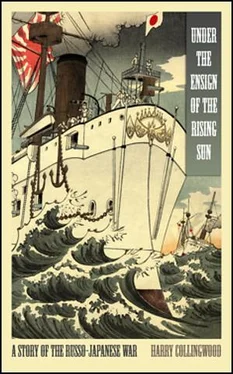Harry Collingwood - Under the Ensign of the Rising Sun
Здесь есть возможность читать онлайн «Harry Collingwood - Under the Ensign of the Rising Sun» весь текст электронной книги совершенно бесплатно (целиком полную версию без сокращений). В некоторых случаях можно слушать аудио, скачать через торрент в формате fb2 и присутствует краткое содержание. Год выпуска: 1916, Жанр: nonf_military, на английском языке. Описание произведения, (предисловие) а так же отзывы посетителей доступны на портале библиотеки ЛибКат.
- Название:Under the Ensign of the Rising Sun
- Автор:
- Жанр:
- Год:1916
- ISBN:нет данных
- Рейтинг книги:4 / 5. Голосов: 1
-
Избранное:Добавить в избранное
- Отзывы:
-
Ваша оценка:
- 80
- 1
- 2
- 3
- 4
- 5
Under the Ensign of the Rising Sun: краткое содержание, описание и аннотация
Предлагаем к чтению аннотацию, описание, краткое содержание или предисловие (зависит от того, что написал сам автор книги «Under the Ensign of the Rising Sun»). Если вы не нашли необходимую информацию о книге — напишите в комментариях, мы постараемся отыскать её.
Under the Ensign of the Rising Sun — читать онлайн бесплатно полную книгу (весь текст) целиком
Ниже представлен текст книги, разбитый по страницам. Система сохранения места последней прочитанной страницы, позволяет с удобством читать онлайн бесплатно книгу «Under the Ensign of the Rising Sun», без необходимости каждый раз заново искать на чём Вы остановились. Поставьте закладку, и сможете в любой момент перейти на страницу, на которой закончили чтение.
Интервал:
Закладка:
And yet, after all, I do not know that there was very much mystery about it, for our Secret Service agents—of whom there were several in Port Arthur—informed us that, from the moment when, on that memorable Sunday, 7th August, one of the first twenty shells fired at the stronghold by the investing Japanese, fell aboard the battleship Retvisan , lying at anchor in the harbour, and seriously damaged her, there had been a general outcry that the Russian fleet ought to go to sea and fight, rather than remain in harbour and be ignominiously destroyed without striking a blow in self-defence.
It was known that Admiral Vitgeft, and Prince Ukhtomsky, his second in command, were utterly opposed to such a course, their freely expressed opinion being that the Russian ships, already more or less seriously damaged by the attacks to which they had been subjected from time to time during the progress of the war, were totally unfit to meet and engage the Japanese fleet, which, they had every reason to believe, was in first-class fighting trim. There were certain officers, however, whose mortification at their enforced inactivity blinded them to the soundness of this judgment. “If the ships must be destroyed, let them be destroyed at sea in the act of inflicting as much injury as possible upon the enemy,” was their contention; and it was certainly a reasonable one. It was broadly hinted that the leader of this faction found means to convey his contention to the ear of Admiral Alexieff; for, strange to say, the following day brought a wireless message from the Commander-in-Chief to Vitgeft, ordering the latter to take his whole fleet to sea and proceed to Vladivostock, fighting his way thither, if necessary. Every effort was of course made by Vitgeft to keep this order a profound secret; but it was necessary to communicate it to the captains of the several ships and other officers whose duties required that they should possess such knowledge, and the delight of some of them at learning that their long-cherished desire was about to be granted was not conducive to secrecy. Moreover, the sudden, feverish hurry and bustle of preparation was a sufficient advertisement of what was impending; and that very night the news was signalled to the blockading squadron in the offing, from which it was as promptly transmitted by wireless to Togo, among the Elliots. The news was confirmed on the following morning by our patrol vessels off the port, from which came the information that a tremendous state of activity was discernible among the Russian ships, and that all indications pointed toward an almost immediate sortie.
The news arrived by wireless, about an hour after sunrise; and immediately upon receiving it the signal was made for all captains to at once proceed on board the flagship. Some such signal had confidently been expected, after the news of the preceding day; we were in fact all waiting for it, and its display was equivalent to the starting signal for a race, for no sooner did the flags break abroad than they were read, and the next instant the shrill piping of many boatswain’s whistles was heard in the calm morning air, the crews of the captain’s gigs were seen rushing along the booms and dropping recklessly down into the boats, and in less than a minute the mirror-like waters of the harbour were being churned into foam as the flotilla of gigs darted away from the ships’ gangway ladders, each striving to be the first to arrive alongside the Mikasa . I was not the first to reach the goal, for the battleships were all lying together, with the cruisers some distance outside them, but my boat was the fourth alongside, beating the Asama’s gig by half a length, to the intense disgust of Captain Yamada, who occupied her stern-sheets.
“Never mind, Yamada, old chap,” I exclaimed, as we shook hands and ascended the Mikasa’s side ladder together; “perhaps you will get the pull of me later on. But I’ll bet you a case of champagne that the Yakumo scores a hit before the Asama , to-day.”
The bet was eagerly accepted, and, chatting gaily, we passed along the flagship’s deck and entered the Admiral’s state cabin, where we found Togo and the captains of the four battleships already assembled and conversing eagerly. The Admiral shook hands with both of us, complimented me upon my rapid recovery, and then turned to welcome the other captains who were fast arriving, while we joined the little but quickly swelling group of officers who had already arrived; for of course Togo would say nothing until everybody was present.
We were not kept waiting very long, however, perhaps a matter of ten minutes after my arrival, and then Captain Ijichi, of the Mikasa , who as each captain arrived, had been ticking his name off a list, announced that all were present, and rapped sharply on the table with his sword-hilt for silence. The next moment, to use a common expression, one might have heard a pin drop. Then Admiral Togo stepped forward, unrolled a chart and spread it open upon the table, and stood for a moment looking round the crowded cabin with a curiously intent and eager gaze.
“Gentlemen,” he said, “the wireless message which has this morning arrived from the blockading squadron off Port Arthur, entirely confirms the news of yesterday, to the effect that the Russian fleet is about to put to sea, probably with the intention of making for Vladivostock. I imagine Vladivostock to be its destination for the simple reason that there is no other port open to it; moreover, as we are fully aware, there is a dry dock at Vladivostock large enough to receive a battleship; and I conjecture the intention of the enemy to be to take his damaged ships there for the purpose of repairing them, so that they may be in condition to reinforce and assist the Baltic fleet upon its arrival in these waters.
“Gentlemen, if that be the enemy’s intention, it must never be carried out; we must prevent it at all costs—short of the loss of our own battleships, which we must preserve in order that we may be able to meet the Baltic fleet upon something like equal terms, when it arrives. Now, the question of how best to meet the Port Arthur fleet without unduly risking our own battleships is one that has greatly exercised my mind ever since the moment when it first became apparent that the Russians were meditating a sortie, and I have formed a plan which I will now lay before you, and upon which I shall be very grateful to receive your frankly expressed criticism and opinion.
“Taking it for granted that the purpose of the Russian Admiral is to make for Vladivostock, I propose to proceed to Encounter Rock, which, as you are all aware, lies directly in the track of ships bound from Port Arthur southward past the Shan-tung promontory,”—the Admiral pointed out upon the chart the positions of the three places mentioned as he spoke—“and there await the arrival of the Russians, who will by that time be so far from Port Arthur that I trust the measures which I propose to take to prevent them from returning may be effective.
“I need not remind you that my instructions are, and have been throughout the war, to risk our battleships as little as possible, since upon them depends the safety of Japan—a fact which I believe we all fully realise; I therefore intend to fight the forthcoming battle at long-range, trusting to our superior gunnery to enable us to inflict the maximum amount of injury upon the enemy with the minimum amount of injury to ourselves.
“I purpose to proceed in the following manner. The Yakumo will lead the fleet to sea, followed by the Kasagi, Takasago, Chitose , Takachiho , Naniwa , and Chiyoda , in the order named. These will be followed, at a distance of three miles, by our six armoured cruisers, in the wake of which will follow the four battleships, with the remaining cruisers and the destroyers bringing up the rear. Further orders I cannot give at present, since my plans are necessarily subject to modification according to the reports which will no doubt come to me from time to time from the blockading squadron, a portion of which will follow the Russian fleet, reporting upon its formation, the course it steers, its speed, and so on. The only thing further which I have now to say is, that the duty of the destroyer flotilla will be to keep the Russian destroyers so fully occupied that the latter will have no opportunity to approach our big ships, while every opportunity must be seized to attack the Russians, especially their battleships. That is all I have to say, gentlemen, except that the fleet which we shall have the honour to meet to-day must be destroyed , and I look to each of you, individually, to give me your best assistance in the accomplishment of this purpose. Now, has any officer any suggestion to offer? I shall be most grateful for any helpful hint.”
Читать дальшеИнтервал:
Закладка:
Похожие книги на «Under the Ensign of the Rising Sun»
Представляем Вашему вниманию похожие книги на «Under the Ensign of the Rising Sun» списком для выбора. Мы отобрали схожую по названию и смыслу литературу в надежде предоставить читателям больше вариантов отыскать новые, интересные, ещё непрочитанные произведения.
Обсуждение, отзывы о книге «Under the Ensign of the Rising Sun» и просто собственные мнения читателей. Оставьте ваши комментарии, напишите, что Вы думаете о произведении, его смысле или главных героях. Укажите что конкретно понравилось, а что нет, и почему Вы так считаете.












